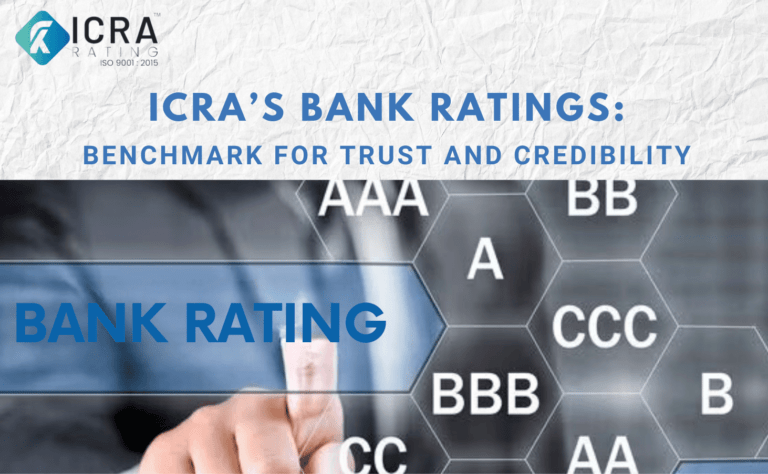
ICRA’s Bank Ratings: Benchmark for Trust and Credibility
Bank ratings by ICRA assess the creditworthiness of the banks. Bank ratings hold significant importance in the financial arena since stakeholders rely on them to comprehend the stability and reliability of banks.
ICRA plays an important role in providing in-depth assessment of entities to gain access to their financial health and overall profile. Bank ratings by ICRA help provide insights regarding the overall performance of the bank such as their asset quality, profitability, and management quality.
The bank rating range is a reflection of a bank’s ability to meet its financial commitments and the potential risks involved. These ratings range from high-grade to speculative grade, further labeling various levels of risks in accordance with each grade as a high grade indicates the very low level of credit risk involved, and similarly, a speculative-grade is an indication of higher credit risk.
Why do bank ratings matter?
These unbiased evaluations hold paramount importance when it comes to stakeholders such as investors, regulators, or customers to make an informed decision. Let’s take a look at the importance of bank ratings and why they matter not just for stakeholders but for banks too.
Boosts Confidence and Decision-making:
To make well-defined decisions regarding investments bank ratings are crucial since investors rely heavily on it. These ratings help investors in maximizing their returns by diversifying their investment portfolio. A bank that has a high rating makes them an attractive investment choice since they indicate low risk thereby enhancing a bank’s reputation and its stock price.
Economic Impact and Market Stability:
Banks have a major impact on the economy and with these ratings, it becomes easy to identify banks whose failure could have a significant impact on the financial landscape. A smooth functioning of the financial market is also crucial in the broader economic system which is done when the public places their trust in a strongly rated entity or banking system.
Access to Capital and Borrowing Cost:
The terms of credit lines and their availability are largely influenced by ratings which can further affect a bank’s liquidity and other operational management. It will be easier to gain access to the capital market at a low cost if the bank is rated high and this is done by negotiating for better loan terms thereby reducing the overall cost of capital.
Invest Smart, Invest Safe – With ICRA
Bank ratings are not just mere numbers but rather they hold paramount importance because of their benefits in the economic sphere. These ratings are beyond assessment since they have a far-reaching impact on investors, regulators, customers, and the bank themselves. When the public is provided with a transparent picture of an entity’s creditworthiness, it becomes easy for them to make decisions and place their trust in the stability of the financial system with these ratings.
Ensure financial stability and unlock financial clarity with ICRA’s trusted bank ratings. With the evolving challenges in the financial sphere, ICRA stands up to its mission with a commitment to provide accurate and transparent ratings. With ICRA’s robust methodology and in-depth insights, stakeholders get to make clear-cut decisions with access to reliable and credible assessments further facilitating economic growth.
For more info Visit here: www.icrallc.com
